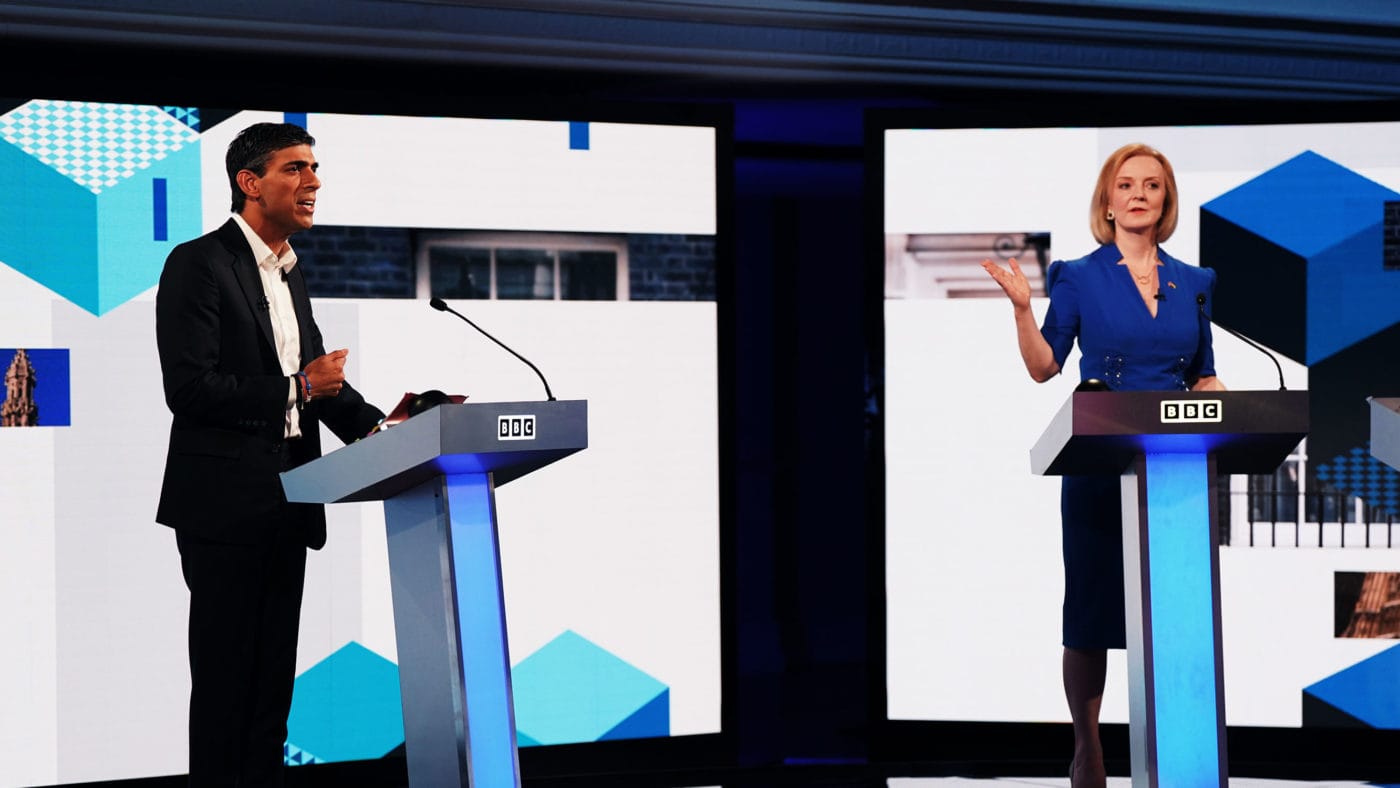If you wanted to find out what the next version of Conservative government holds for the nation, last night’s BBC debate might not have left you much the wiser.
‘Our Next Prime Minister’ was a slightly strange spectacle, with host Sophie Raworth firing questions at the candidates, interspersed with quips and follow-up questions from her colleagues Faisal Islam and Chris Mason and progressively glummer comments from the Stoke studio audience, all of whom had voted Tory in 2019.
The first 30 minutes or so were pretty tooth-and-claw stuff, characterised primarily by Sunak constantly interrupting his opponent (something voters tend to not like very much) and the pair sparring over their tax plans.
While not entirely free of invective, the second half of the debate felt like an invisible white flag had been waved, with both candidates being notably more emollient, Liz complimenting Rishi’s dress sense and Rishi saying how much respect he had for the Foreign Secretary.
As it has been for much of the campaign so far, the big flashpoint between the pair was on tax. Sunak fixed on the idea that Truss’ plans would lead to interest rates going up to 7% – a claim based on a quote from Truss-supporting economist Patrick Minford. It’s worth pointing out here that a) there’s very little logic to suggest a £40bn-odd package of tax cuts would cause interest rates to spike in this way and b) Minford himself says he was misquoted, and was simply sketching out one possible scenario.
At times it felt like we’d gone back in time a decade, with Sunak channelling George Osborne with his lines about the irresponsibility of loading debt on future generations and ‘putting it on the credit card’. As Matthew Parris noted in a recent column, this kind of thing plays very well with a certain kind of Tory member for whom frugality is a cardinal virtue (and with many non-members, for that matter).
Listening to Sunak, you might easily forget that Truss isn’t actually planning to cut corporation tax, but to leave it where it is. Indeed, some might feel the onus should be on Sunak to justify hiking taxes on business in the teeth of a steep economic downturn. For her part, Truss needs to provide more detail on what exactly she plans to do about Covid debt – especially as she offered a pretty vague answer to Faisal Islam’s point that long-term interest rates are now higher than short-term.
As I wrote on Sunday, the striking thing about last night’s debate – and this contest overall – is how little we heard about some of the biggest public policy questions facing the country. There was more discussion of Liz Truss’ earrings yesterday than about house prices or productivity, more on ‘marks out of 10 for Boris Johnson’ than the fact the NHS appears to be dead on its knees (though Sunak does at least have a plan to deal with the hulking Covid backlogs). There was very little too about immigration and small boats, despite the fact this is one of the public’s biggest concerns at the moment.
In terms of the debate questions, the blame for this under-discussion has to go to the BBC, of course, but it would be nice to hear more from both Truss and Sunak on both the long-term challenges facing the health service, and how they plan to build the homes we so desperately need.
Of course, that’s partly because, for now at least, they’re talking to a very specific selectorate of Tory voters – and the candidates’ emphasis and choice of topics reflects that.. Equally, this might look a bit like a general election debate, but it’s much more akin to a popularity contest. That means the personal stuff does matter, much as us wonks would rather debate the finer points of the productivity puzzle than whether we prefer Prada to Claire’s Accessories.
In fairness, this is just the first of a number of debates and interminable husting in the month to come. If the BBC didn’t get to ask everything the public wanted to hear about, Conservative members themselves should have ample chance to put some of these pressing issues to the next PM in the weeks ahead.
Click here to subscribe to our daily briefing – the best pieces from CapX and across the web.
CapX depends on the generosity of its readers. If you value what we do, please consider making a donation.


